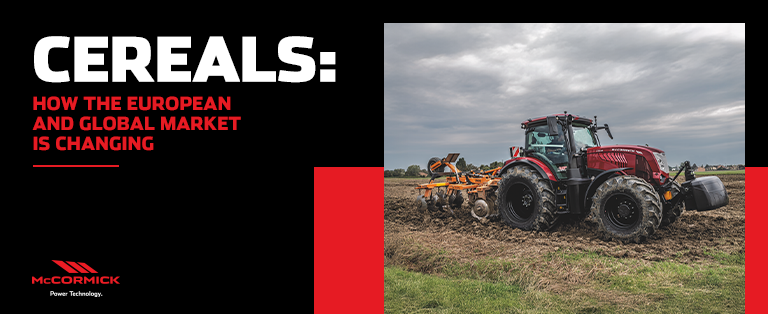CEREALS: HOW THE EUROPEAN AND GLOBAL MARKET IS CHANGING

Table of contents:
-
-
-
-
- The impact of the Ukraine crisis on cereal production
- Cereals for feed and fodder: how McCormick supports its customers during the various stages of production.
- Market demand for new cereal varieties
- Innovation and mechanisation: the key to the future
- Conclusions: an industry in constant evolution, between challenges and opportunities
-
-
-
The cereal sector is undergoing a period of significant change, caused by geopolitical, climatic, and technological factors. Amid wars, shifts in demand, and agronomic innovations, producers today are operating in a new market context. This requires skills, flexibility, and above all, reliable and high-performing agricultural machinery.
The impact of the Ukraine crisis on cereal production
Historically, Ukraine has been one of the world’s leading producers and exporters of wheat, maize, and barley. According to FAO data, prior to the conflict, the country accounted for about 10% of world wheat exports and over 15% of world maize exports. However, the continuing conflict has drastically reduced production and logistical resources, adversely affecting the overall grain supply.
This scenario has put many importing countries under pressure, forcing them to rethink their supply strategies, opening new opportunities for European producers. In fact, there has been an increase in the area cultivated with cereals in Europe, especially in areas where cereal farming had been partially abandoned.
Cereals for feed and fodder: how McCormick supports its customers during the various stages of production.
Not only soft and durum wheat for bread and pasta: demand for cereals destined for animal feed is expanding rapidly. This is driven primarily by rising raw material costs and difficulties in obtaining foreign supplies. Maize, sorghum and triticale are increasingly in demand by farmers seeking local, sustainable solutions that are less affected by international market fluctuations.
In this context, tractors that are versatile and high-performing are essential to ensuring effective land management. For example, tractors such as McCormick X6.4 P6-Drive (with power from 135 to 155 hp) as well as X7.6 P6-Drive and VT-Drive models (with engines from 165 to 240 hp), stand out for their performance, comfort, and advanced technologies. All this makes them ideal for long soil preparation, seeding, and harvesting campaigns.
Market demand for new cereal varieties
New cereal varieties are selected based on genetic innovation and consumer demand. Currently, the focus is on cultivars that are more resistant to drought and disease, as well as on alternative species such as:
- Ancient grains: in demand from a market increasingly focused on nutritional quality and sustainability;
- Gluten-free cereals such as sorghum and millet are growing in demand as food alternatives for coeliac disease sufferers;
- Triticale and oats: renowned for their adaptability and yield, as well as their nutritional value for both humans and animals.
The introduction of these new varieties requires up-to-date agronomic practices as well as the state-of-the-art implements. McCormick’s X6.4 and X7.6 product families offer solutions for every stage of cultivation: from soil preparation to harvesting, but also seeding, fertilisation management, and irrigation.
Innovation and mechanisation: the key to the future
Innovation is the only way to meet the challenges of the cereal market in an increasingly uncertain and competitive environment. Advanced mechatronics, precision farming, and digitisation are pivotal tools for optimising yields, reducing costs and improving crop sustainability.
Technology solutions integrated into McCormick tractors – such as the McCormick Farm and McCormick Fleet Management Apps – provide knowledge of agronomic best practices, remote monitoring of fuel consumption, performance and maintenance scheduling. All this contributes to smart farm management.
Conclusions: an industry in constant evolution, between challenges and opportunities
European cereal farming is undergoing an unprecedented transformation, caused by global factors as well as changing demand in quantity and quality. Producers capable of adapting by investing in innovation and choosing reliable machines – like McCormick tractors – will seize new opportunities and strengthen their competitiveness, even in a market full of challenges.
